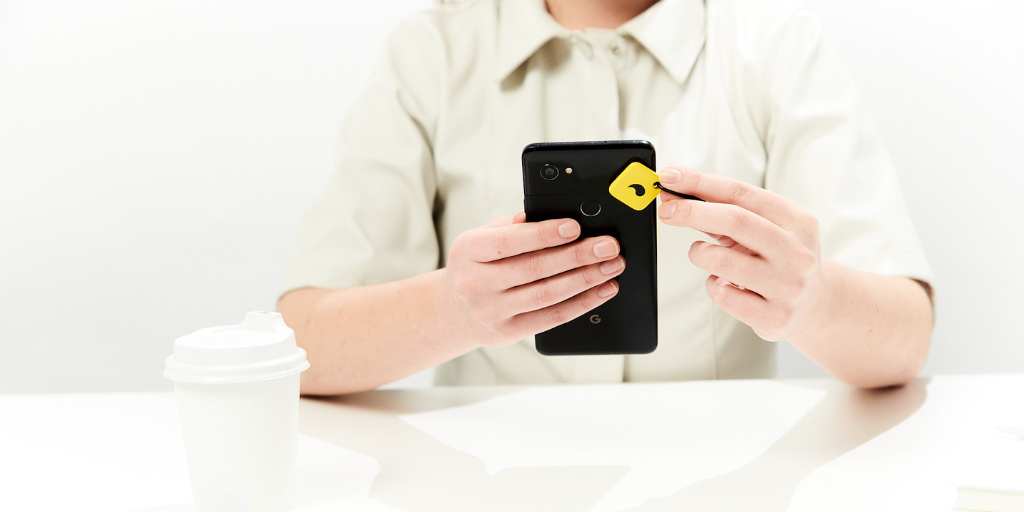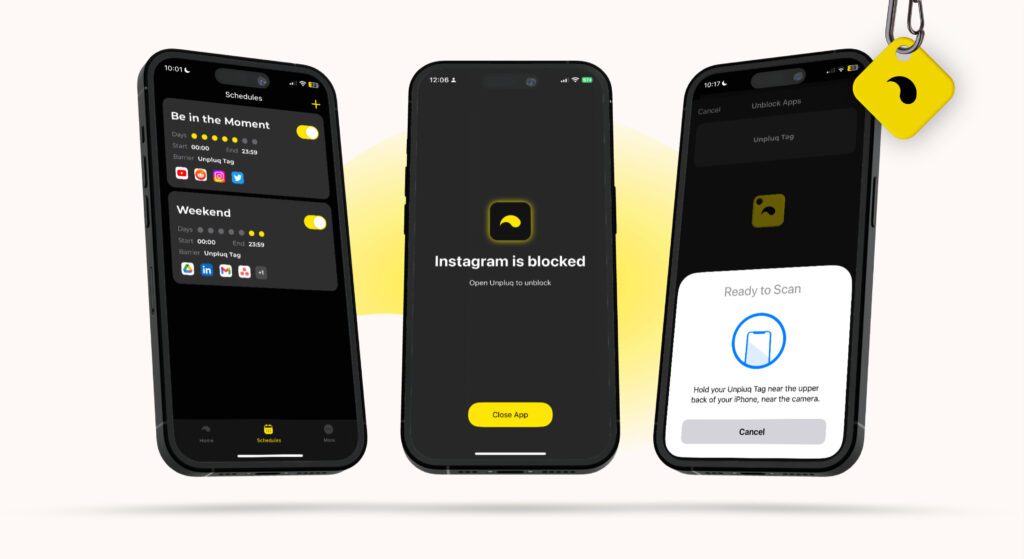
Does this sound familiar? You’re about to go to bed, but you quickly check Instagram — only to find yourself an hour later, still scrolling and sending parenting memes to friends. Or maybe your teenager, despite trying various apps and settings to curb screen time, inevitably gravitates back to their phone when they should be studying.
It’s a scene that plays out in households throughout the country, a testament to the addictive allure of social media and modern technology for both parents and kids. Enter: Unpluq. Founded in 2020, Unpluq promises to help you reclaim 78 minutes of your day from screens. It combines a screen time management app with a unique physical tag, which acts as a key to access blocked apps. That action is meant to change your screen time habits, making scrolling or opening apps a conscious choice.
We emailed with Caroline Cadwell, Unpluq CEO and co-founder, about the habit loops that keep us scrolling, how parents can model appropriate digital behavior for their kids, and the future of screen time management.
What inspired you to create Unpluq, and how do you believe it can play a role in fostering a healthier digital environment at home?
I realized that I was always connected and overworked. Walking my dog? Responding to a Slack message. Dinner with my partner? I just need to do one more thing on the computer. My cofounders, Tim and Jorn, had similar struggles. Tim lost sleep to endless scrolling and watching short videos before bed. Jorn was distracted from his studies. There was no intentionality to it. We didn't have control of our time.
We noticed that existing tools like Screen Time on iOS and Digital Wellbeing on Android were too easy to bypass. With Tim’s background in interaction design and our understanding of Rational Override Theory — basically, making the things you don’t want to do, harder to do — we developed the Unpluq Tag.
It acts as a physical, wireless key to your addictive apps. By using physical interruption, we’ve been able to tap into our brain’s ability to make conscious decisions over automatic, addictive behavior.
As parents and as adults, we're constantly setting examples for the kids around us. But trillions of dollars have been poured into keeping your attention on that screen. We know that more time with our devices makes us unhappy, and we don't want that for the next generation — but it is so hard to break the behavior pattern without effective tools.
Many people equate mindfulness with reducing screen time, but in today's digital age, complete disconnection isn't always feasible. How does Unpluq strike a balance between necessary connectivity and mindful detachment?
Life goes fast with smartphones. We constantly have to process so much information at once. Some of us wish we could go back to the Nokia 5160 era, but we still rely on our phones for essential tasks like banking, work, and socializing.
That's why leaving our phones in another room, using airplane mode, and deleting social media apps aren't solutions that work for people. "Digital detox" is a popular phrase, but it’s unsustainable. How many people do you know who announced they were leaving Facebook for a while, who cropped back up again a few days later?
What Unpluq allows you to do is add a layer of intention to how you use your phone, and that makes it a lasting habit change. It makes it harder to slip into unwanted patterns, encouraging lasting habit changes and allowing you to follow through with your intention to read a book or spend quality time with your kids.

In an interview with GeekWire, you described Unpluq as something that helps people “overcome what has been engineered against the very biology of being human.” This is such a fascinating comment, particularly when considering research that shows babies react negatively when they see their parents engrossed in their phones. Can you expand more on your statement and explain how you believe Unpluq can help people be more present for their families?
For the past decade, as smartphones become more commonplace, we’ve seen a rise in mental health issues — especially with young adults. Rates of anxiety, depression, and suicide have increased. It’s no surprise that these outcomes strongly correlate with screen time.
The attention economy, fueled by features like the “endless scroll” and “like button,” exploits the parts of our brain associated with reward and pleasure. It’s no shock that these technologies and features can be labeled addictive. It’s unreasonable to tell a human brain, programmed to seek reward, to stop seeking it.
Since the launch of Unpluq, what feedback have you received from parents?
The happiest feedback I've gotten from families using Unpluq is that as parents, they were able to set a good example. They were able to be present with their children.
One customer said he's been more present at dinner, when previously, he was still engaged with work. Another said, “My son, 13, is a big fan of Unpluq. He used to scroll TikTok and Instagram for hours and hours — now he does his homework.”
It's pretty universal that parents want to be the best they can for their kids, to raise them as well as they can, and to set them up for success. Much like any other important life skill, parents have to teach their kids what responsible phone and internet usage looks like, how to self-regulate, and how to moderate our intake. By and large, we’re failing to do so because we lack effective tools.
A friend is an elementary school teacher. She asked her class what their parents could do better, and roughly 80% of the kids said some version of "stop using the phone and pay attention to me when I'm talking." It's heartbreaking — but understandable, too.
What has surprised you most about your work with Unpluq?
The lasting change that Unpluq helps people accomplish has surprised and delighted me. Most people continue to use it long-term, saving an average of one hour and 22 minutes a day. That means, in a year, they've saved 35 waking days of their life. How incredible is it to gain an extra month every year, all in your control?
Learn more about how Unpluq works. This interview has been edited for length and clarity.